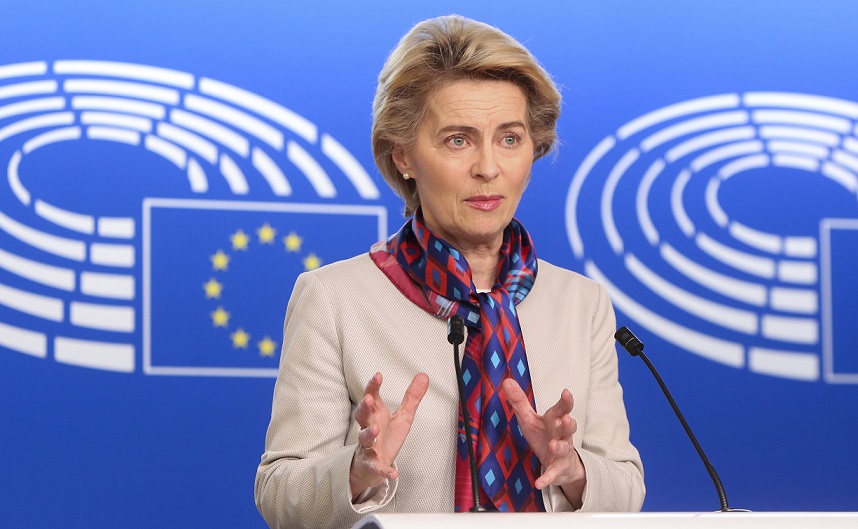Let me start by saying that I am very grateful to the German Presidency and to Angela Merkel for the efforts undertaken since this summer. From the Commission’s proposal on the budget and NextGenerationEU to the agreement in July in the Council and the finalisation in the next days. This has underlined, indeed, Europe’s ability to come together and the capacity to act in the face of the worst crisis the EU has ever faced. It would not have been possible without the steady leadership of the Chancellor, the rotating Presidency, and we are very grateful for that. The agreement will help us provide a strong economic response to the crisis while preserving the rule of law. Citizens and the EU economy need our support more than ever and they need it now. So we need to finalise the adoption of the Package, with the help of the European Parliament, as soon as possible. And Member States also have to ensure a swift ratification. This is essential for us to power our economy as soon as possible.
Of course, the launch of NextGenerationEU is also a key component of our climate ambition. Now, that we have secured the funding, we have the means for our actions. And that is why I am delighted that, together with the German Presidency, we were able today to reach an agreement on the proposal for a new EU climate target. We will reduce emissions by at least 55% by 2030. Today’s agreement puts us on a clear path towards climate neutrality in 2050. It gives certainty to investors, to businesses, to public authorities and to citizens. It future-proofs our Union.
All EU countries should benefit from the transition – with economic growth, a cleaner environment, and healthier citizens. The European Green Deal will be our growth strategy. On the coronavirus pandemic, right now, the European Union is working full speed to review the safety of vaccines and make them available. We aim to authorise the BioNTech/Pfizer vaccine by the end of the year, subject to EMA’s opinion. EMA’s opinion on the Moderna vaccine should come before mid-January. And a rolling review of data for AstraZeneca/Oxford and Johnson & Johnson vaccines is ongoing.
But it is vaccination, and not vaccines, that saves lives. I called on all the Member States to finalise their preparations for the start of vaccination. We stand ready to support. We also care for our neighbourhood. The European Union will coordinate the donation of vaccines by Member States, in particular to protect the health care workers in the Western Balkans and in our neighbourhood. And finally, we should indeed start working now on avoiding future crises. I asked Leaders for their support to advance rapidly on getting the European Health Union off the ground. And thank you very much, Angela, for your words concerning that.
Finally, I briefed the leaders on the negotiations with the United Kingdom. Positions remain apart on fundamental issues. On the level playing field, we have repeatedly made it clear to our UK partners that the principle of fair competition is a pre-condition for privileged access to the EU market. It is the largest single market in the world. And it is only fair that competitors to our own enterprises face the same conditions on our own market. But this is not to say that we would require the UK to follow us every time we decide to raise our level of ambition, for example in the environmental field. They would remain free – sovereign if you wish – to decide what they want to do. We would simply adapt the conditions for access to our market according to the decision of the United Kingdom. And this would apply vice-versa.
On fisheries: Here also, we continue to have a gap. We have not yet found the solutions to bridge our differences. We understand that the UK aspires to control its waters. The UK must, on the other hand, understand the legitimate expectations of EU fishing fleets built on decades, and sometimes centuries, of access. On these and other points, our negotiators are working.
We will decide on Sunday whether we have the conditions for an agreement or not. In the meantime, the Commission has proposed four targeted contingency measures yesterday. They provide a short-term fix to ensure basic connectivity in air and road transport for six months. And we are also proposing to the UK to ensure reciprocal access to each other’s waters for next year. One way or the other, in less than three weeks, it will be: New beginnings for old friends. Thank you.
Jeremy Thomson Cook, Chief Economist at Equals Money stated: “Heading into the weekend, the mood around the UK’s ability and willingness to agree a trade deal with the European Union is set to weigh further on sterling. Comments from the Prime Minister that there is a ‘strong possibility’ of no trade deal being struck and that Brussels’ current offer ‘isn’t right for the UK’ but that a no-deal divorce would still be ‘very good’, are not new, but coming so close to the Sunday deadline is a worry.”
“The cost of hedging against falls in sterling over the next three weeks and into the new year are at their highest level since the aftermath of the referendum back in 2016. That is not a sure-fire reason for sterling declines in itself, but does show that investors are prepared to pay increasing costs to protect their assets against a sudden fall in the pound. Of course, if there is a deal, then the rally for the pound will be much larger. Many businesses will be nervously looking at any deal through the lens of what it means for their business, and what final preparations they need to make in the coming weeks.”
Source: European Commission



